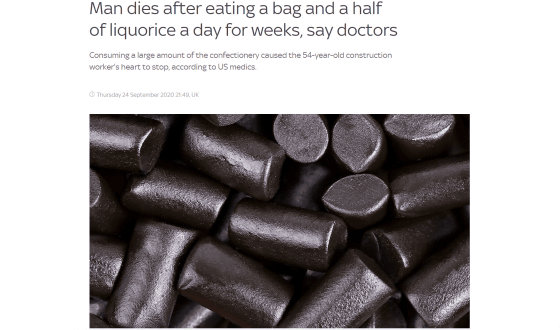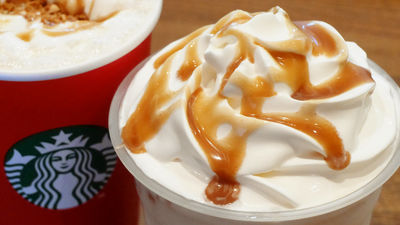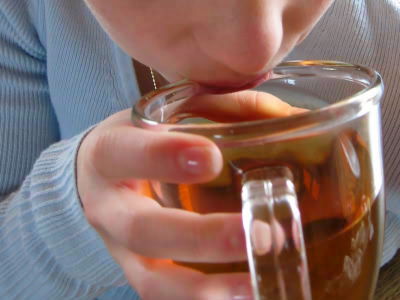A man who eats sweets containing 'licorice' used for root beer and salty liquorice dies

Case 30-2020: A 54-Year-Old Man with Sudden Cardiac Arrest | NEJM
https://www.nejm.org/doi/full/10.1056/NEJMcpc2002420
Man dies after eating a bag and a half of liquorice a day for weeks, say doctors | US News | Sky News
https://news.sky.com/story/man-dies-after-eating-a-bag-and-a-half-of-liquorice-a-day-for-weeks-say-doctors-12080761

The patient was reportedly a 54-year-old man working as a construction worker in Massachusetts, USA, who collapsed and was in cardiac arrest while having lunch at a fast-food restaurant. When an ambulance crew performed cardiopulmonary resuscitation , the man's heartbeat returned for a while, but unfortunately the man died the next day.
Health care workers who treated them have found that men's blood potassium levels are extremely low, which is believed to have caused arrhythmias. Doctors said in a case report that glycyrrhizic acid in licorice confectionery caused a potassium imbalance.
Glycyrrhizic acid is an active ingredient contained in licorice root and is 30 to 50 times as sweet as sugar, so it is used in many sweets and beverages. However, the action of glycyrrhizic acid may cause hypokalemia and cause symptoms such as high blood pressure, said Neel Butala, a cardiologist at Massachusetts General Hospital, saying, 'Even if you take a small amount of licorice, Blood pressure can rise, 'he said, pointing out that overeating licorice is dangerous.
A few weeks before his death, the man switched from fruit-flavored gummies to licorice sweets called black licorice, and he said he ate more than 1.5 bags of black licorice every day. As a result, the intake of glycyrrhizic acid exceeded the permissible amount, and it is believed that it caused problems in male cardiac function.

The U.S. Food and Drug Administration (FDA) warns that heart function can be affected, especially if people over the age of 40 continue to eat more than 2 ounces (about 57 grams) of black licorice per day for two weeks. I have. Robert Eckel, a cardiologist at the University of Colorado, cautions that licorice is used not only in licorice sticks, but also in jelly beans, licorice herb tea, and some Belgian beers.
The FDA allows up to 3.1% of food weight to contain glycyrrhizic acid, but many licorice confectioneries and other foods do not reveal the exact content of glycyrrhizic acid per ounce.
The United Kingdom National Health Service (NHS) also warns that too much licorice intake can cause serious health problems such as elevated blood pressure and arrhythmias. People over the age of 40, who have a history of heart disease and high blood pressure, should be careful about overdose of licorice. “No matter how old you are, you should avoid eating large amounts of black licorice in a short amount of time,” says the NHS.
'All of our products are formulated in accordance with FDA regulations and are safe to eat,' said Jeff Beckman, a spokeswoman for The Hershey Company , which sells licorice confectionery. However, he insisted that all foods, including sweets, should be enjoyed in 'moderate amounts.'

Related Posts:







